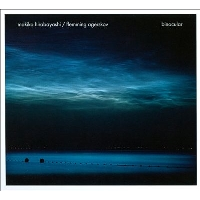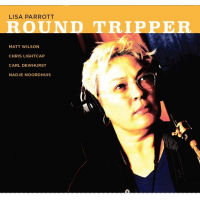Home » Jazz Articles » Album Review » Makiko Hirabayashi/Flemming Agerskov: Binocular
Makiko Hirabayashi/Flemming Agerskov: Binocular
Pianist Makiko Hirabayashi has a distinct, recognizable style of composition and performance. Her music has a kind of floating quality created by melodic phrases and lines which imply tonality rather than stating it, phrase lengths and rhythmic accents which further weaken any overt tonality, plus a piano and pedal technique which many times overlaps notes, creating many high overtones that add a shimmering envelop to the sound.
She wanted to explore making music without a rhythm section (drums and bass) and reached out to someone she had known for twenty years, Flemming Agerskov (trumpet/flugelhorn), whose physical sound fit her conception, but also, more importantly, was someone who was comfortable "working without a net." His own lines have the same floating quality as Hirabayashi's, and the music they make together sounds as if it comes from one mind.
Recorded at the Rainbow Studio in Oslo, Norway by Jan Eric Kongshaug, Binocular has not only the enormous sound stage (a quality of recording space and technique) but also the "feel" (a quality of the music) of an ECM record, and could easily be mistaken for one, with even the cover fitting the ECM "vibe."
The music's emotional temperature is cool, with a touch of sadness or the more complex melancholy that is never maudlin. The feeling is closer to that of late dusk rather than early dawn, but with the uplifting intensity of creation, exploration and wonderment. Every note, every gesture matters and there is nothing extra.
Accordionist Francesco Cali was asked to join Hirabayashi and Agersov in Oslo because his musicianship fit not only their concept, but the recording space as well. This decision was a master stroke, because Cali's understated playing adds just the right spice on the six tracks on which he plays—he practically steals the record.
The opening track "Migrating South" quickly establishes the album's aesthetic. A long, but precisely fashioned, horn line sounds against an undamped piano, producing wondrous harmonics. Agerskov's attack and airiness is such that trumpet and flugelhorn sound very much alike. The central section begins with a piano introduction followed by melodic horn line which has the quality of optimistic melancholy, reiterated by the accordion which adds further to the music's emotional dichotomy—it aches without sadness.
A short improvised dialogue between Agerskov and Cali follows, and the intensity deepens. "Shifting Light" is a pure piano piece with an introduction that sounds like "Goodbye Pork Pie Hat" (which has itself complex emotions) and which moves to a very long-limbed melody which briefly alludes to a Chopin nocturne and is supported by a Chopin-esque bass figure. The music is saturated with emotion, the effect of which is concentrated due to its sparseness.
If there is a core to the album, it's tracks five through nine, with "La Tourneuse De Pages" as a kind of overall high point. This set of tracks is surrounded by "Jagged" and "Snare Drum," both of which play against expectations (at least after they get going), and act to provide an emotional resting place.
"Readings" connects Agerskov with none other than Tomasz Stańko by sound, inflection and emotional content, while Cali shines as he and Hirabayashi play a touching duet section.
Binocular is very deep and more than a bit mysterious, meant to be savoured with concentrated listening many times, and can be given the highest compliment by comparing it to one of Stanko's greatest releases: Leosia.
Track Listing
Migrating South; Dialogue #1; Shifting Light; Jagged; Dialogue #2; La Tourneuse De Pages; House Of Ants; Readings; When The Road Curves; Snare Drum; Expectations; Oslo.
Personnel
Makiko Hirabayashi
pianoMakiko Hirabayashi: piano; Flemming Agerskov: trumpet, flugelhorn; Francesco Cali: accordion (tracks 1, 2, 4, 5, 6, 8).
Album information
Title: Binocular | Year Released: 2011 | Record Label: Stunt Records/Sundance Music
Tags
PREVIOUS / NEXT
Support All About Jazz
 All About Jazz has been a pillar of jazz since 1995, championing it as an art form and, more importantly, supporting the musicians who make it. Our enduring commitment has made "AAJ" one of the most culturally important websites of its kind, read by hundreds of thousands of fans, musicians and industry figures every month.
All About Jazz has been a pillar of jazz since 1995, championing it as an art form and, more importantly, supporting the musicians who make it. Our enduring commitment has made "AAJ" one of the most culturally important websites of its kind, read by hundreds of thousands of fans, musicians and industry figures every month.




















